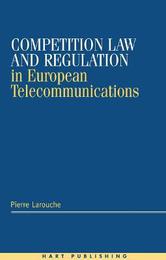
|
Competition Law and Regulation in European Telecommunications
Hardback
Main Details
| Title |
Competition Law and Regulation in European Telecommunications
|
| Authors and Contributors |
By (author) Pierre Larouche
|
| Physical Properties |
| Format:Hardback | | Pages:504 | | Dimensions(mm): Height 234,Width 156 |
|
| ISBN/Barcode |
9781841131443
|
| Classifications | Dewey:341.7577 |
|---|
| Audience | | Undergraduate | | Postgraduate, Research & Scholarly | | Professional & Vocational | |
|---|
|
Publishing Details |
| Publisher |
Bloomsbury Publishing PLC
|
| Imprint |
Hart Publishing
|
| Publication Date |
1 May 2000 |
| Publication Country |
United Kingdom
|
Description
Using numerous practical examples, this book examines the evolution of EC telecommunications law following the achievement of liberalization, the main policy goal of the 1990s. After reviewing the development of regulation in the run-up to liberalization, the author identifies the methods used to direct the liberalization process and tests their validity in the post-liberalization context. A critical analysis is made of the claim that competition law will offer sufficient means to regulate the sector in the future. Particular emphasis is given to the way in which EC Competition Law changed in the 1990s using the essential facilities doctrine, an expansive non-discrimination principle and the policing of cross-subsidization to tackle what were then thought of as regulatory matters. Also examined within the book is the procedural and institutional interplay between competition law and telecommunications regulation. In conclusion, Larouche explores the limits of competition law and puts forward a long-term case for sector-specific regulation, with a precise mandate to ensure that the telecommunications sector as a whole fulfils its role as a foundation for economic and social activity.
Author Biography
Pierre Larouche is a Professor of Law at Tilburg University.
ReviewsObviously, we have here a very serious, well grounded, solid and systematic analysis of an issue which proves essential in all legal systems where telecommunications are liberalised, together with other utility industries. -- Paul Nihoul * Journal of Network Industries * Larouche's book probably constitutes one of the basic references just about everyone with an interest in European communications should have in his library. The structure is logical. The argumentation is crystal clear. The organisation is perfect -- Paul Nihoul, Rijksuniversiteit Groningen * Yearbook of European Law *
|